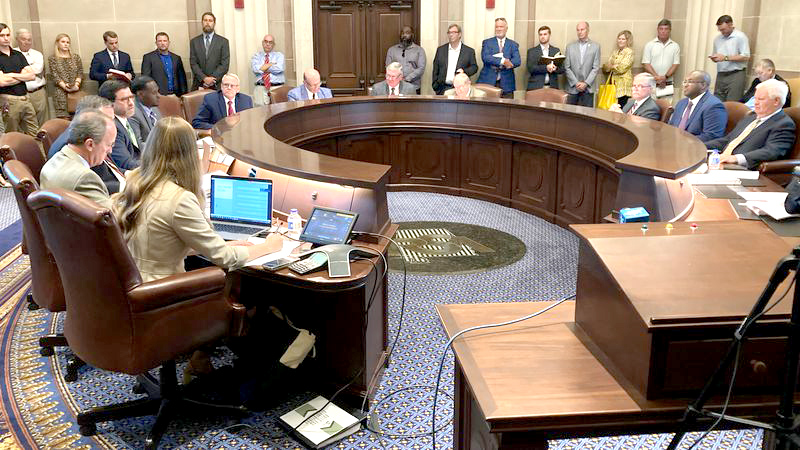By Mike Cason
The Alabama Medical Cannabis Commission voted today to accept 90 applications as properly submitted by companies that intend to take part in the state’s new medical marijuana industry.
The AMCC will begin reviewing the applications for cultivators, processors, dispensaries, secure transporters, testing labs, and integrated licensees with multiple functions. The AMCC is scheduled to award licenses at its meeting on June 12.
“We are excited to be one step closer to program implementation,” AMCC Director John McMillan said in a news release. “Now that we have our official slate of applicants, the sixty-day window to review applications has started.”
Today’s move is the latest step in setting up the new industry that the Alabama Legislature approved in 2021. Alabama is one of 38 states that have authorized the use of marijuana products for medical purposes, according to the National Conference of State Legislatures.
The AMCC posted the list of applicants on its website. The AMCC accepted applications until Dec. 30, 2022. Applicants were given opportunities to correct or amend their applications until March 24.
The state’s medical cannabis law placed limits on how many licenses the AMCC can issue in some categories. Here are the number of applications accepted and the maximum number of licenses the AMCC can award:
- Cultivators: 12 applications accepted; limit of 12 licenses to be issued.
- Processors: 11 applications accepted; limit of 4 licenses to be issued.
- Dispensaries: 18 applications accepted; limit of 4 licenses to be issued. (Each licensee can have three dispensary locations.)
- Secure transporters: 9 applications accepted; no limit specified.
- State testing labs: 2 applications accepted; no limit specified.
- Integrated facilities: 38 applications accepted; limit of 5 licenses to be issued. (Integrated facilities will be authorized to cultivate, process, transport, and dispense medical cannabis. Each integrated licensee can have up to five dispensaries).
The University of South Alabama will work with the AMCC to evaluate, score, and rank the applications. The AMCC has full discretion on the licensing decisions within the limits set by the Legislature, according to a news release from the AMCC.
The AMCC said it would make application contents (as redacted by applicants) available for public inspection on Friday. The AMCC will accept public comments in favor or opposed to granting licenses to applicants until May 14. Public comments must be made electronically through the AMCC website.
“We look forward to an operational program that will not only benefit patients by providing relief to pain and other debilitating symptoms, but also will provide opportunities for patients with these debilitating conditions to function and have a better quality of life,” AMCC Chairman Dr. Steven Stokes said. Stokes is an oncologist.
Doctors who receive training in medical cannabis will be able to recommend medical marijuana products for more than a dozen conditions — autism spectrum disorder; cancer-related pain, weight loss, and vomiting; Crohn’s Disease; depression; epilepsy or conditions causing seizures; HIV/AIDS-related nausea or weight loss; panic disorder; Parkinson’s Disease; persistent nausea; post-traumatic stress disorder (PTSD); sickle cell anemia; spasticity associated with multiple sclerosis or spinal cord injury; Tourette’s Syndrome; a terminal illness; and conditions causing chronic or intractable pain.
The legislation allows the products to be pills, capsules, tinctures, gelatinous cubes, oils, creams, patches, suppositories, nebulizers, and liquids or oils for an inhaler. No raw plant materials or products for smoking or eating will be allowed.
Go here for more information from the Alabama Medical Cannabis Commission.












